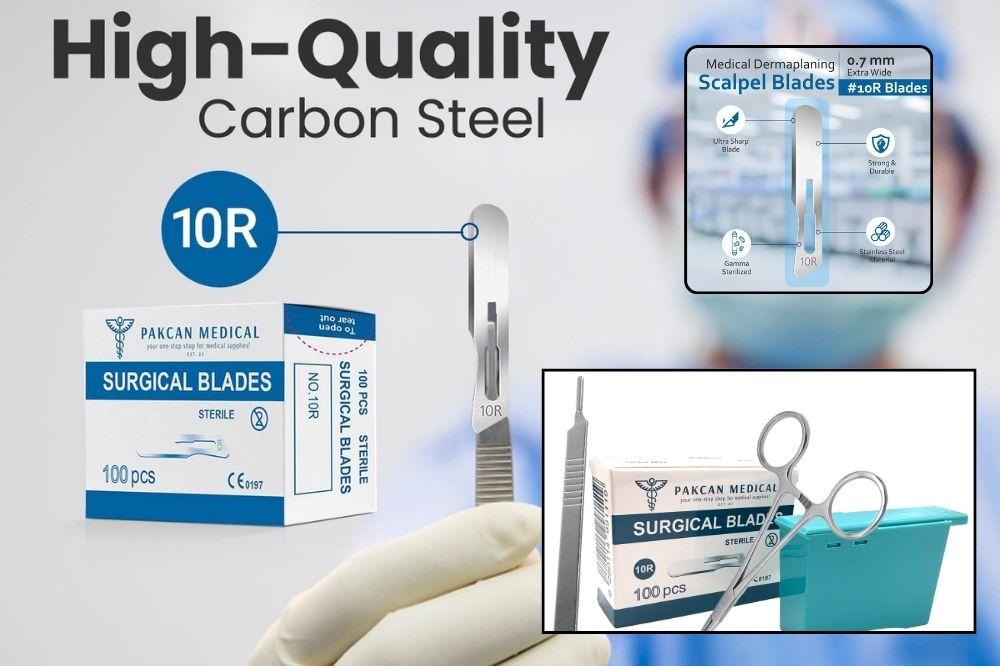Using a Dermal Curette for Effective Skin Care Procedures

Accuracy and aesthetically pleasing results are critical in general surgery and dermatology. The seemingly simple instruments known as dermal curettes are essential to accomplishing these objectives. With their sharp, loop-shaped tips, these instruments are essential for several skin care operations, from treating some types of skin cancer to removing benign blemishes. The uses, methods, advantages, and factors to be considered for the safe and efficient application of dermal curettes are all covered in this article.
Dermal Curette
One specialized surgical tool for scraping or debriding tissue is a dermal curette. It usually has a short, sharp loop at the end of the handle that is either oval or round. This stainless steel loop makes it possible to precisely remove aberrant tissue and superficial skin lesions. Curettes are made for various uses and available in various sizes and forms.
Smaller curettes with finer loops are ideal for delicate procedures like removing small skin tags or warts. In contrast, larger, sturdier curettes are better suited for de-bulking larger lesions or tumors. The selection of the appropriate curette size and shape is crucial for achieving the desired outcome while minimizing trauma to the surrounding skin.
What Are The Applications of Dermal Curette?
The versatility of dermal curettes is that they can be used for various purposes:
Actinic Keratosis
Long-term exposure to the sun can cause precancerous skin lesions called actinic keratoses. By removing these lesions, curettage stops them from possibly developing into squamous cell cancer. To guarantee total elimination, the process entails scraping away the injured skin cells and is frequently followed by cryotherapy or electrocautery.
Benign Skin Care Tumor Treatment
Benign skin lesions like seborrheic keratoses are commonly removed using dermal curettes. Often manifesting as waxy, brown, or black elevated patches, seborrheic keratoses are noncancerous skin growths. Curettage is a rapid and scar-free way to get rid of these growths, especially if the patient finds them unsightly.
Wart Removal
Warts triggered by the human papillomavirus (HPV) are frequently removed with dermal curettes. Curettage removes the wart tissue by scraping it off, usually combined with topical or cryotherapy treatments to kill the virus and stop it from recurring. This technique works very well for exophytic or elevated warts.
Debridement of Chronic Wounds
The debridement of chronic sores, including ulcerated diabetic feet and pressure ulcers, is accomplished with cutaneous curettes. Debridement is the process of eliminating sick or necrotic tissue to encourage healing. Curettage makes it possible to remove devitalized tissue alone while leaving intact tissue intact, resulting in a cleaner wound bed.
Melanonychia
To treat longitudinal melanonychia (dark streaks in the nail), curettage might be very important in nail matrix treatments. To ensure total excision and lower the chance of postoperative recurrence, the pigmented nail matrix can be carefully removed with a modified dermal curette. This method provides more control and mobility, which results in more precise tissue removal.
Cyst Excision
The protein keratin, which makes up skin and nails, is found inside benign, closed sac-like formations called epidermoid cysts. The contents of smaller cysts and, in certain situations, the whole cyst wall can be removed by curettage, even though total surgical excision is frequently recommended.
Advantages of Dermal Curettes
-
Effective Removal of Benign Lesions: Curettage effectively removes benign skin issues like warts and cysts for cosmetic improvement.
-
Minimally Invasive Skin Cancer Treatment: For superficial skin malignancies, curettage is a minimally invasive treatment option that is easy to use, effective, and frequently leaves little scarring. Small, superficial basal and squamous cell carcinomas with distinct contours respond especially well to treatment. Using a curette, layers of the malignant lesion are scraped away throughout the treatment.
-
Diagnostic Tool: It provides a sample for accurate diagnosis, aiding in identifying skin conditions.
-
Outpatient Convenience: Curettage, which is usually done as an outpatient procedure, enables a quick return home with little recovery time. There is no need for sutures.
-
Cost-Effective: Curettage is an efficient and cost-effective treatment method, especially when combined with desiccation, offering a high cure rate for carefully selected skin cancers.
-
Suitable for Specific Cases: It may be an ideal choice for patients who cannot bear more invasive surgery. Also, curettage and cautery are suitable for removing skin tissue softer than the surrounding skin.
-
Quick Procedure: The procedure can be performed in at least one hour.
Conclusion
Dermal curettes are essential for treating various skin conditions, from benign lesions to superficial skin cancers, offering minimally invasive options with good cosmetic results. Mastery requires training, technique, and patient selection. Pakcan Medical provides disposable dermal curettes that enhance hygiene, convenience, and precision. These instruments ensure effective, safe, and hygienic skin care, aligning to provide the best possible patient care.
- Art
- Causes
- Crafts
- Dance
- Drinks
- Film
- Fitness
- Food
- الألعاب
- Gardening
- Health
- الرئيسية
- Literature
- Music
- Networking
- أخرى
- Party
- Religion
- Shopping
- Sports
- Theater
- Wellness


